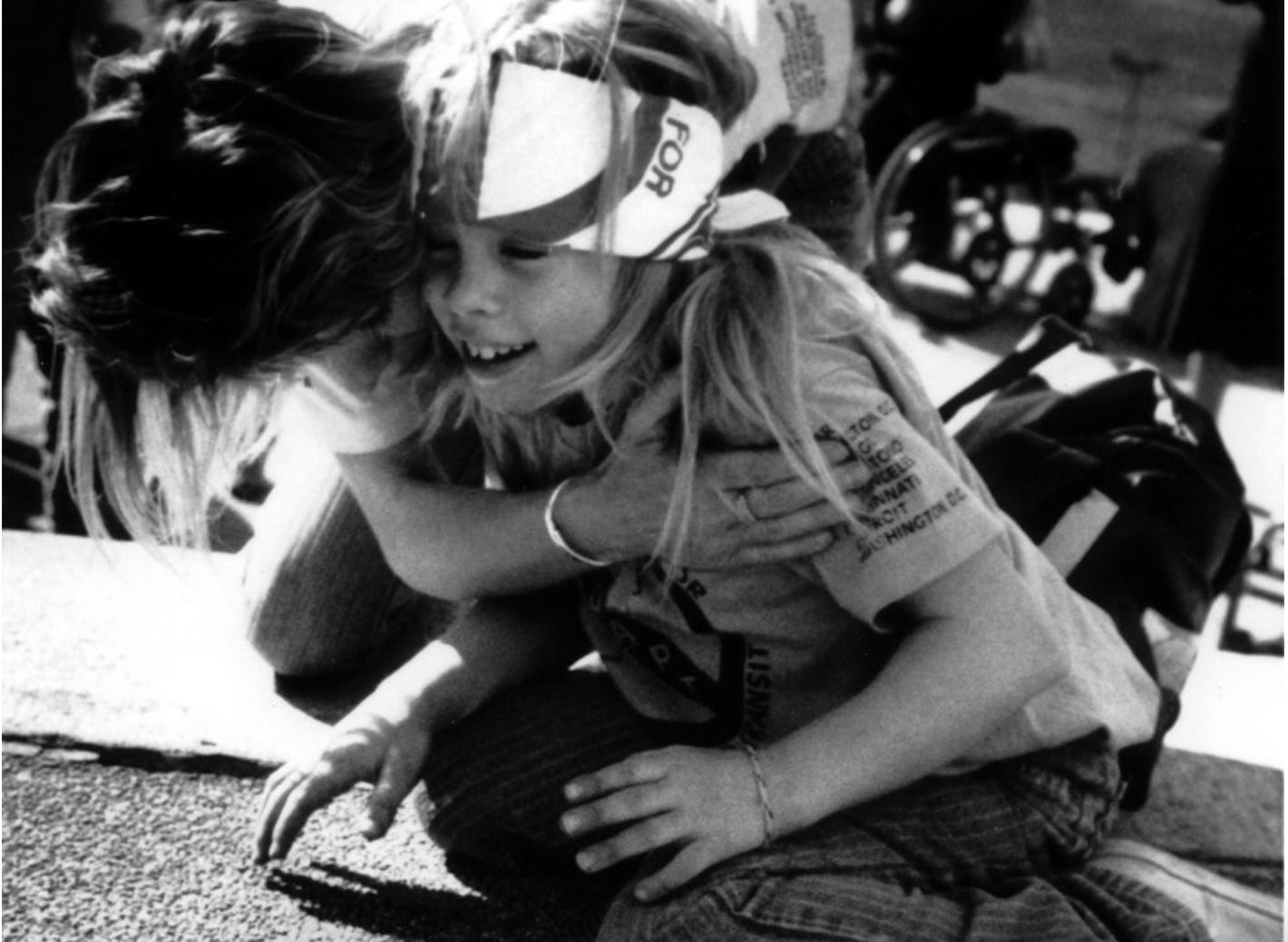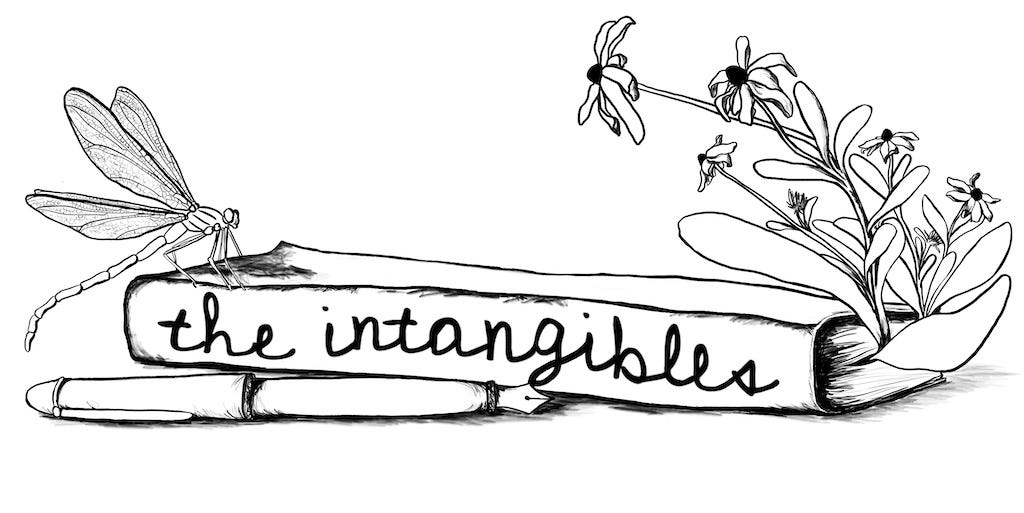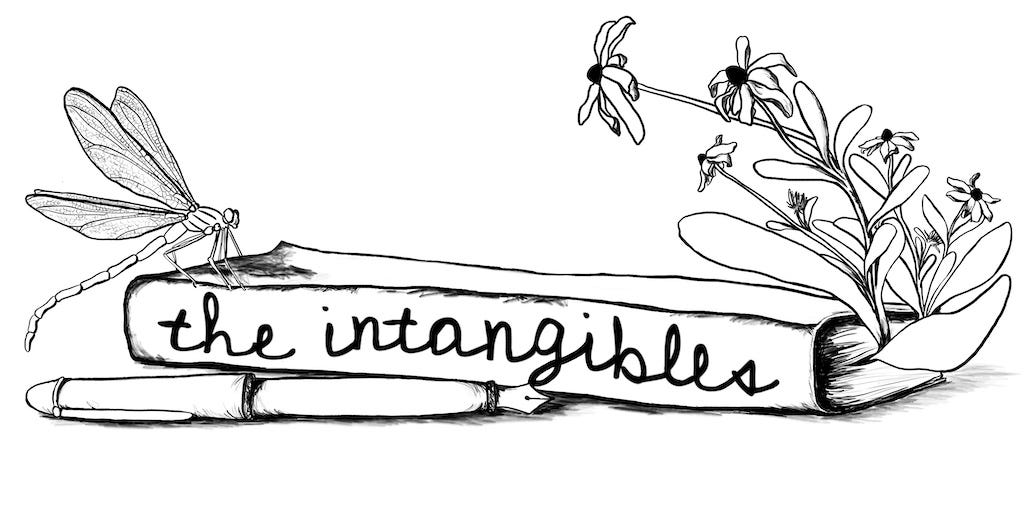Hi, readers of the intangibles! I’m essayist Allison Kirkland, and this publication was created to celebrate and explore the world of creative nonfiction and the writing life. I’m so glad you’re here.
Each July I focus my publication on Disability Pride Month.
the intangibles is a reader-supported publication that wouldn’t exist without you. If you’ve been a regular reader this year and you’d like to support an independent writer and help make the literary landscape a more accessible, transparent and collaborative space, I invite you to upgrade to a paid subscription.
Have you ever heard of the Capitol Crawl? Let me set the scene: the year is 1990. President George H.W. Bush is in favor of passing the Americans with Disabilities Act (ADA), but it has been months since he voiced his initial support and nothing is moving forward. Passing this legislation is too expensive, the House Reps claim, and as a result the bill is languishing in limbo.
Disability activists have been trying to get The Americans with Disabilities Act passed, in some form or another, for the last several years. The last significant piece of disability-related legislation, Section 504 of the Rehabilitation Act of 1973, was passed over 15 years ago, and many of the regulations it outlined are difficult to enforce. As a result change is not happening quickly enough. Activists hope that passing the ADA will ensure that the needs of disabled Americans — all 40 million of them, at this time — will finally be taken seriously.
If the ADA law passes it will change so many things. It will mandate that public transportation — such as buses and trains — be accessible to anyone with a disability. It will create standards for accessibility in common spaces such as movie theaters, parks, hotels and restaurants. These will include changes such as ramps, bathroom stalls that could accommodate wheelchairs, closed captioning for TV programs, and a host of other things meant to make the world more livable for the 40 million Americans who identify as disabled.
On March 12, 1990, emboldened by their mounting frustration, the grassroots disability rights group American Disabled for Accessible Public Transit (A.D.A.P.T.) spearheads what will become known as the Capitol Crawl. This group of activists has been working toward equality for disabled Americans since 1983. On March 12th members of A.D.A.P.T., about 500 in total, many of them using wheelchairs, march from the White House to the steps of the U.S. Capitol building.
The U.S. Capitol, called “The People’s House,” has no ramp for entry because accessible ramps are not required by law. In order to continue their march and enter the building, these activists will have to ascend the stairs — all 87 of them.
In an act of perseverance and grit, roughly 70 of these activists — of varying ages and abilities — get out of their wheelchairs and begin to crawl up the steps of the Capitol building. It is an unusually hot day in March — climbing toward 80 degrees. But they crawl.
Some of these activists are paralyzed from the waist down. Some are helped along by caretakers or family or mobility devices. Maybe some of these activists have navigated steps before. Some probably have not. Many are cheered on by their families and loved ones. Inch by inch, they crawl. One step, then two. Halfway there, then three quarters, then more than half.

Many of these activists are carrying the Declaration of Independence rolled up in their pockets to present to their congressmen when they reach the top.
Although the media coverage is not extensive, the few photos and videos that make it onto the news have an impact. The ADA is signed into law 6 months later, on July 26th, 1990. It will be said that the Capitol Crawl was the turning point.
I’ve been thinking a lot about the Capitol Crawl this July, the month that has been allocated for Disability Pride month, a month that is intended to highlight the history, the struggles and the triumphs of the disabled community. I’ve been thinking about how I didn’t even learn about this Civil Rights demonstration until a few years ago when I watched the fantastic documentary Crip Camp.
I thought about the Capitol Crawl on July 4th when the “Big Beautiful Bill” was signed into law on Independence Day. This bill is poised to strip resources from millions of disabled Americans, many of whom would still not have access to the steps of the Capitol building if not for the activists who came before them.
I wonder if any of the men and women who championed that bill into law have ever watched as people who look like them and share their struggle used their bodies to fight against inequality.
I wonder if they have experienced times in their lives when they themselves have been forced to crawl — maybe not literally, but figuratively — toward their own independence and selfhood.
When I watch coverage of the Capitol Crawl, I swell with pride. I can feel my chest puffing out, can feel myself standing taller, taking up more space, like the deep well of strength that these activists pulled from to make it up these stairs might be something I can drink from, too. To be at all associated with the scrappy, persevering disabled Americans who paved the way for my life to be just a little bit easier is an incredible honor. I am proud to be disabled.
Want to read more of what I have written during Disability Pride Month?
A Wound in the Shape of Your Words
Hi, readers of the intangibles! I’m Allison Kirkland, and this publication was created to celebrate and explore the world of creative nonfiction and the writing life. I’m so glad you’re here.
Little Remoras
the intangibles is a reader-supported publication that wouldn’t exist without you. If you’ve been a regular reader this year and you’d like to support an independent writer and help make the literary landscape a more accessible, transparent and collaborative space, I invite you to upgrade to a paid subscription. Thank you so much for being here.
You are reading the intangibles, by writer and creative writing instructor Allison Kirkland. This publication is geared toward writers of memoir and creative nonfiction and the people who love them.
If a paid subscription doesn't make sense for you right now, there are other ways to support the growth of this reader-supported publication:
click that little heart to "like" the post
gift a subscription to a creative friend
share this essay with another writer
leave a comment and help grow this creative community
take a screenshot of your favorite snippet and tag me on Instagram @alliekirkland
Thanks for reading. I’m so glad you’re here.







I know of the Capital Crawl because of you, Allison! Not with this piece but of your "Such a Pretty Girl" book recommendation.
Thank you for your words, Allison!